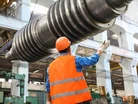Top 10 construction technologies in 2023

The construction industry has always been marked by high-risk work environments, limited productivity, lack of automation and long lead times. However, with the advent of advancing technology in construction, the industry is transforming fast. These top 10 construction technologies in 2023 are set to revolutionise the construction industry, enhancing efficiency and effectiveness, and reducing labour costs.
1. Parametric Modeling
Parametric modeling involves designing computer-aided models that can be manipulated and adjusted to suit specific construction requirements. This technology enables architects, designers, and builders to design prototypes with reduced iterations and faster design cycles.
2. Drones
Drones are aerial devices that have become critical tools in the construction industry. They offer precision insights, high accuracy, and real-time progress reports that improve communication between designers, architects, builders, and client stakeholders.
3. Autonomous Heavy Equipment
Autonomous heavy equipment reduces labour costs and enhances the effectiveness and efficiency of construction work. This equipment can perform several functions, including grading, excavation, earth moving, and other related tasks.
4. Real-time monitoring
Real-time monitoring technology is based on the use of wireless sensors, geospatial imaging, motion detectors and satellite technology to track and monitor on-site aspects of construction, delivering real-time status updates of projects.
5. Augmented Reality
Augmented reality (AR) is a technological tool that enables builders, architects, and other construction industry stakeholders to generate 3D visualisations of different designs, plan and simulate virtual walkthroughs, and view virtual progress reports.
6. Construction Robots
Robots have excellent scalability, versatility, and precision in the construction industry. They offer a range of advantages such as increased productivity, zero work-related injuries, and save on labor costs.
7. Wearable technology
Wearable technology such as smart helmets, glasses or gloves ensure increased safety and productivity on job sites. Health monitoring and GPS tracking in wearable devices provide valuable insights into construction worker safety, reducing the risk of accidents.
8. Green technology
The construction industry is one of the significant contributors to greenhouse gas emissions. The use of sustainable and environmentally friendly practices such as alternative construction materials, green insulation and zero-emission equipment, reduce the construction industry's carbon footprint.
9. Artificial Intelligence
With AI, the construction industry can now automate and optimize processes that previously required human involvement, resulting in lower costs, greater efficiencies, and faster project turnaround times.
10. 3D Printing
3D printing technology enables the creation of precision-made construction components that help reduce construction times, achieve higher tolerances, lower waste and reduce material costs.
The use of these advanced technologies in the construction sector is revolutionising the industry, enhancing efficiency, effectiveness, and safety. Robust, integrated construction technology platforms are the future of construction, which reduces lead times and improves productivity, while ensuring safe and secure construction sites. Construction companies that embrace these technologies would enjoy increased productivity, faster project completion times, and greater competitiveness as projects are delivered with greater efficacy and quality.



